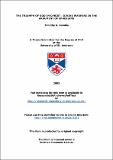Files in this item
The triumph of God in Christ : divine warfare in the argument of Ephesians
Item metadata
| dc.contributor.advisor | Longenecker, Bruce | |
| dc.contributor.author | Gombis, Timothy G. | |
| dc.coverage.spatial | 207 | en_US |
| dc.date.accessioned | 2012-02-16T14:30:12Z | |
| dc.date.available | 2012-02-16T14:30:12Z | |
| dc.date.issued | 2005 | |
| dc.identifier | uk.bl.ethos.525965 | |
| dc.identifier.uri | https://hdl.handle.net/10023/2321 | |
| dc.description.abstract | In this thesis I argue that the letter of Ephesians contains a coherent argument and that this argument is animated by the ideology of divine warfare. This ideological tool was utilized throughout the ancient world to assert and defend the cosmic supremacy of national deities, and appears throughout the Old Testament in texts that declare the exalted status of Yahweh over all other gods and over the forces of chaos that threaten creation. This ideology is applied to Ephesians with the result that what many regard as the central portion of the letter-Ephesians 2--contains a complete cycle of this mythological pattern. Here, within a context of praise and worship (1:1-19), the cosmic Lordship of Christ is asserted (1:20-23) and the triumphs of God in Christ over the powers that rule the present evil age are elaborated (2:1-22). God in Christ has triumphed over the powers that hold humanity captive to death by raising believers to life and seating them in the heavenlies with Christ. Further, Christ triumphs over the powers and their divisive effects within humanity by creating a new unified humanity that shares in the life of God in Christ by the Spirit. I then attempt to demonstrate that reading Ephesians through this lens provides satisfying solutions to a number of problems in subsequent sections of the letter. The 'autobiographical' remarks in Eph 3:2-13 are not intended as an apostolic defence, but rather are an explanation of how Paul's imprisonment, which would appear to be a devastating argument against the cosmic Lordship of Christ, actually serves to epitomize and reinforce that exalted status. I also argue that the difficult quotation of Psalm 68 in Eph 4:8 finds a satisfying solution through the application of divine warfare ideology. Finally, I argue that this reading demonstrates that the two halves of Ephesians are integrally related-that the exhortatory portion is a call to the New Humanity to engage in divine warfare against the evil powers, embodying the triumph of God in Christ in their corporate life. | en_US |
| dc.language.iso | en | en_US |
| dc.publisher | University of St Andrews | |
| dc.rights | Creative Commons Attribution-NonCommercial-NoDerivs 3.0 Unported | |
| dc.rights.uri | http://creativecommons.org/licenses/by-nc-nd/3.0/ | |
| dc.subject.lcc | BS2695.52G7 | |
| dc.subject.lcsh | Bible. N.T. Ephesians--Criticism, interpretation, etc. | en_US |
| dc.subject.lcsh | Spiritual warfare--Biblical teaching | en_US |
| dc.subject.lcsh | Good and evil--Biblical teaching | en_US |
| dc.subject.lcsh | Powers (Christian theology)--Biblical teaching | en_US |
| dc.title | The triumph of God in Christ : divine warfare in the argument of Ephesians | en_US |
| dc.type | Thesis | en_US |
| dc.type.qualificationlevel | Doctoral | en_US |
| dc.type.qualificationname | PhD Doctor of Philosophy | en_US |
| dc.publisher.institution | The University of St Andrews | en_US |
This item appears in the following Collection(s)
Except where otherwise noted within the work, this item's licence for re-use is described as Creative Commons Attribution-NonCommercial-NoDerivs 3.0 Unported
Items in the St Andrews Research Repository are protected by copyright, with all rights reserved, unless otherwise indicated.


